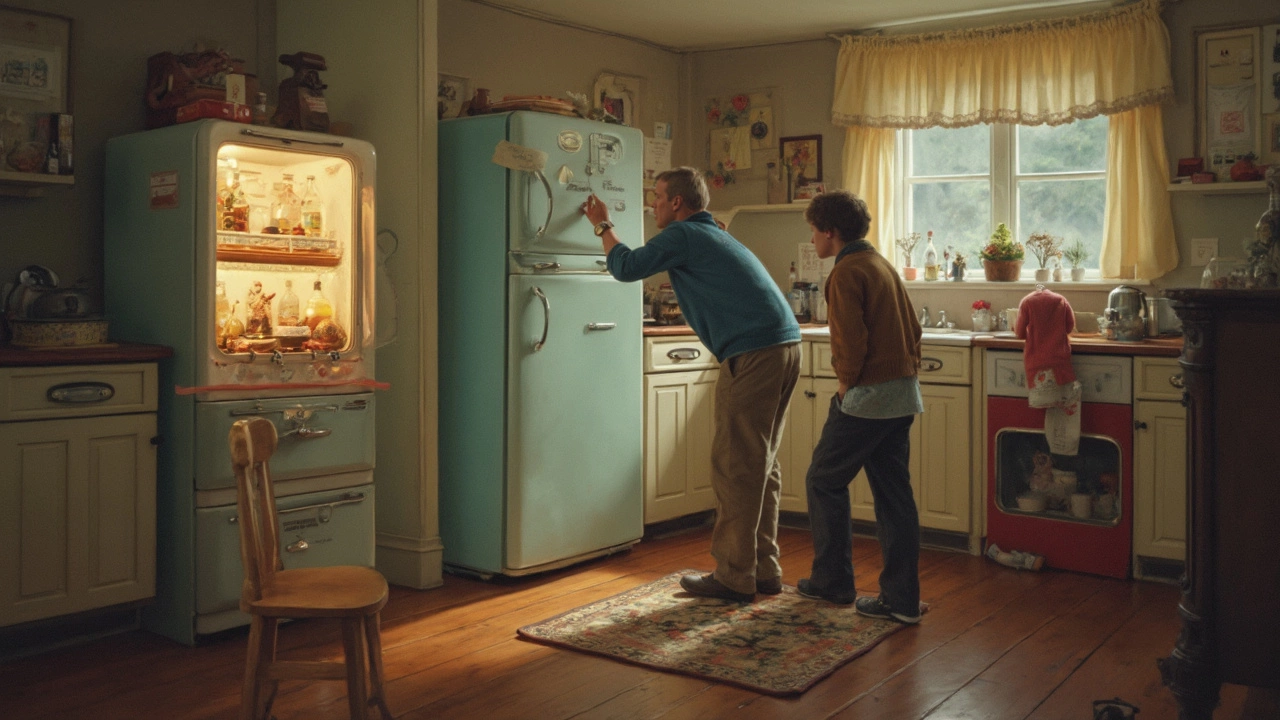Alright, picture this: you're reaching for a midnight snack, but when you open the fridge, the milk is warm, and the cheese looks iffy. Nobody wants spoiled groceries, right? A fridge on the fritz can really throw a wrench in your day—and your budget. But how do you know when your refrigerator is actually going bad?
The thing is, refrigerators don't just suddenly give up; they drop little hints before calling it quits. Maybe you notice odd noises, like a rattle that's more than just a one-off ruckus. Or perhaps your freezer isn’t so frosty anymore. These quirks might just be signs that your fridge is crying out for help.
Understanding the subtle signs can save you from unexpected fridge failures. Weird noises, an overworked compressor, or a sweating fridge exterior might be telling you something’s up. Let’s dig into these warnings a bit more so that you can tackle them before they escalate into a full-blown breakdown.
- Recognizing the Signs of a Failing Fridge
- Troubleshooting Common Refrigerator Issues
- When to Call a Professional
- Maintaining Your Fridge for Longevity
Recognizing the Signs of a Failing Fridge
So, you've got this feeling that something isn't quite right with your fridge. Before diving into a DIY repair or calling in a professional, it helps to recognize the symptoms that spell trouble for your trusty refrigerator.
First up, pay attention to the noises. A gentle hum is normal, but if it starts to clank, buzz loudly, or make what sounds like weird gurgling, that's a hint your unit might not be functioning as it should. Often, a wobbly fan or a dying compressor could be the culprit.
Temperature issues are another biggie. If your fridge struggles to keep things cool, you might notice milk going off sooner than it should or - cue the horror - melted ice cream that’s become a sad puddle of memories. The refrigerator's thermometer can be a great tool here. Ideally, your fridge should be at or below 40°F (about 4°C).
Also, watch out for excessive condensation. A bit of moisture inside is normal, especially if it's humid, but pools of water inside or outside might mean there's a problem with the seals, or the internal temperature isn’t consistent.
Next, check the electricity bill. An unexpected spike might mean your fridge is working overtime to keep things cold, probably due to failing components or bad door seals.
Your sense of smell can be a huge ally too. An unpleasant odor from the back of the fridge might signal electrical issues or other internal problems that need checking out.
Fridge repair might not be your favorite weekend project, but knowing these signs can save you time and prevent food from turning into an unplanned science experiment. If you spot any of these signals, it’s probably time to consider some troubleshooting or professional help.
Troubleshooting Common Refrigerator Issues
So your fridge is acting up? Let’s dive into some common problems and how to sort them out. Not every issue needs a professional; sometimes a little DIY action can do the trick. Here's how you can tackle some frequent fridge repair issues yourself.
First up, if your fridge isn't cooling properly, check the temperature settings. Yeah, it sounds basic, but sometimes those knobs get nudged. Make sure the thermostat is set between 35-38 degrees Fahrenheit—this is the sweet spot for keeping your food fresh. If it’s still warm, the condenser coils might be dusty. These coils, usually at the back or underneath, need cleaning now and then. A quick once-over with a vacuum can improve your fridge's cooling efficiency.
Next, a noisy fridge can be a head-scratcher. Common culprits include the evaporator fan or compressor. If the noise ramps up when you open the door, it's likely the fan. This might call for a replacement part. If the sound persists, pay attention to when it happens. New fridges often have energy-efficient features like adaptive defrost, which can cause unusual sounds. Make sure to also check that the fridge is level, as an uneven fridge can make more noise than necessary.
Got water pooling in your fridge? It could be a blocked defrost drain. This usually happens if bits of food or ice block the drain hose. A quick DIY fix is to flush it out with warm water using a turkey baster.
Then, there’s the problem of a freezer refusing to freeze. Often, this is a ventilation issue. Ensure no food items are blocking the vent where air flows from the freezer to the fridge compartment. Keeping some space around this vent helps maintain proper air circulation.
And while on the topic of actions you can take, here’s a quick list of things to check regularly to avoid future refrigerator maintenance headaches:
- Inspect door seals for cracks or gaps — they should hold a dollar bill tightly when closed.
- Make sure your fridge is at least a couple of inches away from the wall, allowing ventilation.
- Every six months, replace the water filter if your fridge has one for an ice maker or a water dispenser.
As you troubleshoot, remember that not every issue can be tackled with a wrench and some elbow grease. Sometimes, calling a professional is the best route to ensure nothing major goes wrong.

When to Call a Professional
Sometimes a fridge issue isn't just a quick DIY fix. If you’ve tried the basics and your refrigerator is still struggling, it might be time to bring in an expert. But when exactly should you pick up the phone?
Let’s break it down. First off, if you find your fridge isn’t cooling at all and your Tupperware is turning into a science project, that’s a big red flag. Another tell-tale sign is constant buzzing or humming, louder than usual. That might mean your fridge's compressor is working overtime—a job best left for the pros to handle.
Water pools inside the fridge or from beneath it are also signs of trouble. This might indicate a problem with the defrost drain or water supply line, both of which can lead to bigger issues if not handled correctly.
"A persistent temperature above 40°F can invite bacteria growth in food," says appliance expert Mary Stevens. "Regular maintenance checks can prevent health hazards and costly repairs."
Here’s a quick checklist of when to consider calling in the cavalry:
- Unusual noises that don't seem to stop.
- Frequent water leaks around or in the fridge.
- The fridge isn't staying cool and food spoils faster than usual.
- Frost build-up in the freezer that won’t go away.
If your refrigerator is facing any of these issues and you’re not confident tackling them yourself, don’t wait too long. Doing so can prevent potential damage and extend the life of your appliance. Remember, while it might cost you upfront, getting a professional's touch can save you from buying a brand-new fridge down the line.
Maintaining Your Fridge for Longevity
Want your fridge to last longer and avoid costly fridge repair? Regular care is the key! It's like giving your car an oil change—not flashy, but totally worth it. First off, cleaning those condenser coils should be a priority. Dust and debris can pile up, making your fridge work harder than a marathon runner in August. You can find these coils either on the back of the fridge or along the bottom. Just grab a vacuum or a coil cleaning brush and you’re good to go.
Now, let’s talk seals. The door seals, or gaskets, should be airtight. If you notice any cracks or feel a draft, it's time to change them. A simple dollar bill test can confirm this: close the door on a bill and try pulling it out. If it slips out easily, your fridge is probably leaking cool air.
Temperature settings are another chapter in fridge maintenance. Keep your fridge at around 37°F (about 3°C) and the freezer at 0°F (-18°C). This keeps food fresh without putting extra stress on your appliance. Remember, more heat equals more stress.
Also, clear any excess clutter. Overloading shelves blocks air circulation causing the fridge to struggle—less is more here.
Check out this quick checklist to keep your fridge humming along:
- Clean the interior spills instantly.
- Defrost the freezer as per the manufacturer's instructions.
- Ensure the fridge is level to avoid unnecessary noise and stress.
- Replace water filters timely if your fridge has water and ice dispensers.
By staying on top of these simple tasks, your fridge can serve you longer and your kitchen will be free of sudden appliance troubleshooting woes.
| Task | Frequency |
|---|---|
| Condenser Coil Cleaning | Every 6 months |
| Gasket Check | Annually |
| Temperature Check | Quarterly |
| Declutter Shelves | Monthly |

